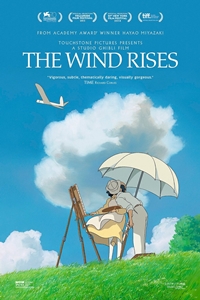The Wind Rises (Kazetachinu) (PG-13) No Rating
 For a career that was spent constructing mystical worlds like the ones seen Princess Mononoke, Kiki's Delivery Service, and Spirited Away, it might seem a little odd that Hayao Miyazaki's swan song is centered on the real-life story of about the famed aeronautical engineer Jiro Hirokishi. But even though there aren't any magical creatures flying around the skies of a very true-to-life 20th century Tokyo, that doesn't mean that The Wind Rises is lacking in wonder. In fact, Miyazaki's last film may be his most inspiring yet, and is doubtlessly his most personal. After all, it's hard not to see the parallels between the subject of The Wind Rises and its creator himself.
For a career that was spent constructing mystical worlds like the ones seen Princess Mononoke, Kiki's Delivery Service, and Spirited Away, it might seem a little odd that Hayao Miyazaki's swan song is centered on the real-life story of about the famed aeronautical engineer Jiro Hirokishi. But even though there aren't any magical creatures flying around the skies of a very true-to-life 20th century Tokyo, that doesn't mean that The Wind Rises is lacking in wonder. In fact, Miyazaki's last film may be his most inspiring yet, and is doubtlessly his most personal. After all, it's hard not to see the parallels between the subject of The Wind Rises and its creator himself.
The film follows the famed aeronautical engineer who dreamed of flight, but is kept out of the cockpit thanks to his nearsightedness. Instead, Jiro decides to focus his attention on designing and creating planes. He's the kind of person that can see inspiration in the slope of a fish bone; every little slice of life can serve as source of inspiration.
Eventually, Jiro becomes Japan's premiere aeronautical engineer - and how could he not when he has the voice of Stanley Tucci in his ear, spurring him on? Tucci plays a dreamed-up version of Giovanni Caproni, a real life Italian aircraft engineer who inspires Jiro to keep working towards his goals. The dream sequences where Caproni visits Jiro are some of the film's finest moments, and Tucci puts as much Italian-accented verve and hope into his performance that almost inspires you to get out of your theater chair and start tinkering with whatever pursuit lifts your own wings. It is in these dream sequences where The Wind Rises really soars, as we watch the two inventors construct odd, curious, and wondrous flying contraptions that can take to the skies, even when the real world physics won't allow them to. Rises might lacks the fantastical worlds and creatures that populate Miyazaki's other works, but it's no less magical. But beyond the wonder of building airplanes, there are hard truths to be learned, and as Jiro realized soon enough, his creations will be dropping the bombs that will serve as Japan's introduction to much of the western world.
But for all the fantastic dreamscapes and characters that populate Jiro's world, from Tucci's lively Caproni, to Jiro's excitable sister who has dreams of her own, to even his love interest Naoko, the one flaw in the film seems to be Jiro himself. Joseph Gordon-Levitt, who voices Jiro in the English translation of the film, sounds utterly lifeless, and even in the film's emotional peaks and valleys, it sounds like he's reading a telephone book. And while the rest of the English voice cast mostly soars to the occasion, including Martin Short who voices Jiro's hot-tempered boss, and Werner Herzog who helps give the enigmatic Castorp an air of mystery, Jiro is a black hole of personality, and Levitt doesn't manage to give much of anything to Jiro.
The Wind Rises is also a crash course in early 20th century Japan, as we see a country yearning to show the world it's mettle, and we get a peak at the countries' growing pains. We see various events play out on screen including a beautifully animated depiction of the 1923 earthquake that levels Tokyo, and rips through japan like a cresting tidal wave (Studio Ghibli is in top form in the animation department as usual). We also see glimpses of the tuberculosis crisis, the depression, and the early foundations of Japan's relationship with Nazi Germany. These events don't take away from what is firmly Jiro's story, but serve as context to his journey
The Wind Rises is an ode to the dreamers. It's for the creatives who craft their goals in their heads, and unleash their creations for the world to see. It's a uniquely inspiring film that stands with the best of Miyazaki's filmography, and provides a graceful end note to a marvelous career.
4/5
Follow @Hollywood_com
Follow @CurrentlyJordan
To get the full Quicklook Films experience, uncheck "Enable on this Site" from Adblock Plus
box office top 10

Civil War Released: April 12, 2024 Cast: Kirsten Dunst, Wagner Moura 25.7M

Godzilla x Kong: The New Empire Released: March 29, 2024 Cast: Rebecca Hall, Brian Tyree Henry 15.5M

Ghostbusters: Frozen Empire Released: March 22, 2024 Cast: Paul Rudd, Carrie Coon 5.8M

Kung Fu Panda 4 Released: March 8, 2024 Cast: Jack Black, Viola Davis 5.5M

Dune: Part Two Released: March 1, 2024 Cast: Timothée Chalamet, Rebecca Ferguson 4.3M

Monkey Man Released: April 5, 2024 Cast: Dev Patel, Sikandar Kher 4.1M

The First Omen Released: April 5, 2024 Cast: Nell Tiger Free, Bill Nighy 3.8M

The Long Game Released: April 12, 2024 Cast: Dennis Quaid, Gillian Vigman 1.4M

Shrek 2 Released: May 19, 2004 Cast: Mike Myers, Eddie Murphy 1.4M

Sting Released: April 12, 2024 Cast: Alyla Browne, Ryan Corr 1.2M






